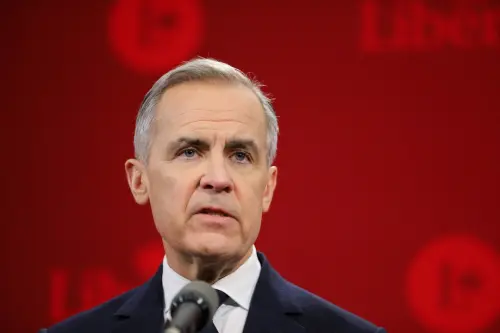Ottawa, March 7 (Reuters) - Mark Carney, a leading candidate for Canada's next Prime Minister, is a seasoned central banker experienced in crisis management. His potential challenge lies in guiding Canada through the influence of Donald Trump.
The Liberal party will announce Justin Trudeau's replacement on Sunday following a vote by party members. Trudeau stepped down in January due to declining approval ratings after nearly a decade in office.
Carney, aged 59, stands as a political outsider without prior governmental experience, which would typically be a hindrance in Canadian politics. Yet, his distance from Trudeau and notable career in banking have worked in his favor. Carney asserts that his crisis management skills and negotiation expertise uniquely qualify him to handle Trump.
"I know how to manage crises ... In a situation like this, you need experience in terms of crisis management, you need negotiating skills," Carney stated during a recent leadership debate.
Born in Fort Smith in the remote Northwest Territories, Carney studied at Harvard, excelling in college ice hockey as a goalkeeper.
As the candidate with the most party support and fundraising among four Liberal contenders, Carney is poised to potentially be the first Canadian Prime Minister without a legislative background or cabinet experience.
Carney advocates for retaliating against Trump's tariffs and expanding trade relations in the medium term to combat economic challenges.
In the upcoming election, the Liberals will confront the official opposition, led by Pierre Poilievre, an entrenched politician with limited international exposure.
In contrast, Carney is a well-traveled individual whose career includes a stint at Goldman Sachs before ascending to the position of Deputy Governor of the Bank of Canada in 2003. His tenure was marked by effective crisis management during the financial crisis, implementing emergency loan facilities and providing clear guidance on interest rate policies.
Rumors of Carney's political ambitions emerged early on, prompting him to refute such claims with a touch of exasperation.
The Bank of England recruited Carney in 2013, making him the first non-British governor in the bank's three-century history. Acknowledged for his steady hand during turbulent times, he faced challenges regarding Brexit and inflation discrepancies.
Post-Bank of England, Carney undertook roles with the United Nations and spearheaded initiatives focused on finance and climate change.
Despite his extensive financial background, Carney's lack of political experience became evident when questioned about corporate decisions. Reflecting on criticism, Carney acknowledged the challenges of transitioning from finance to politics.
